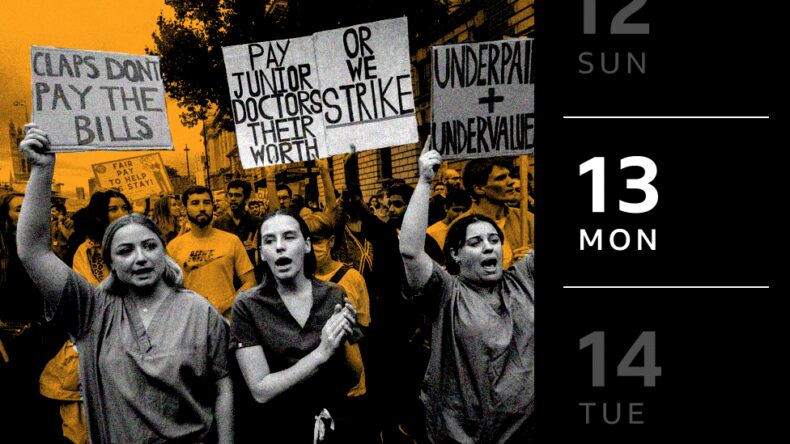In the newest round of industrial action, UK hospital doctors went on a three-day pay strike on Monday, the first of a week that will witness teachers, train workers, and government employees walk out.
The junior doctors claim that since 2008, they have actually had a 26% salary cut due to years of pay increases that have lagged behind inflation.
The body which represents them, the British Medical Association (BMA), started a marketing effort before the strike began, claiming that a freshly qualified doctor made less money than some coffee shop employees.
A 72-hour work stoppage by 61,000 junior doctors, which includes trainees, began at 7 am on Monday in order to demand a salary increase. Steve Barclay, the health secretary, had urged the Hospital Consultants and Specialists Association (HCSA) and the British Medical Association (BMA) to end the strike without agreeing to begin talks. The bodies have therefore consented to carry out the preplanned strikes.
In areas providing life-or-death care, such as A&E, critical care, and maternity services, junior physicians won’t be accessible.
According to the British Medical Association, the 26 percent increase is being requested as “full pay restoration” for the actual revenue loss that has occurred since 2008/09 as mentioned above. To offset this loss, the junior doctors require a wage increase of 35%.
Junior doctors, who make up around 45% of the NHS’s medical workforce, are competent medical professionals, frequently with decades of training, who work under the supervision of senior doctors and make up a sizable portion of the nation’s medical population.
The state-funded NHS, which is already under stress from waves of strike activity by nurses, ambulance drivers, and other staff, will come under even more strain as a result of the junior doctors’ walkouts starting on Monday.
Even though the NHS promised to “protect emergency and critical care, maternity care, and where possible prioritize patients who have been waiting for elective care and cancer surgery for the longest,” thousands of appointments and procedures will be postponed throughout the 72-hour strike.
Over the next three days, the health service will experience “extensive disruption,” according to Professor Stephen Powis, medical head of NHS England, who spoke to a media outlet. He claimed that this is probably the most chaotic stretch of strike days we’ve experienced all winter.
The junior doctors’ current walkout is the longest one they have ever held. The senior experts, also known as consultants, will offer coverage.
According to reports, people are quitting left, right, and center in fields where compensation is simply declining year after year, conditions are deteriorating, and patient care is suffering. Individuals are departing because they feel unappreciated.
The government has stated that public sector wage restraint is required to bring double-digit inflation under control in light of the numerous sectors that are currently experiencing strikes, including train conductors and teachers.
Poh Wang, a member of the BMA council, declared that they have hit an impasse where they have had enough.
The junior doctors’ union’s lack of engagement with the government has been “very disappointing,” as stated by Prime Minister Rishi Sunak.
As part of one of the largest single days of industrial action in years, members of several unions will go on protest on Budget Day on Wednesday.













